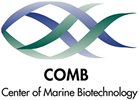|
|
Biology of Methanogenesis |
Department of Marine
Biotechnology UMBC - Institute of Marine & Environmental Technology
Press Releases
|
BALTIMORE, Md. --Researchers at UMBIís Center of MarineBiotechnology (COMB), and the Medical University of South Carolina have found that as few as two or three strains of bacteria can work together to break down commercial mixtures of polychlorinated biphenyls (PCBs), a family of highly toxic compounds that are widespread contaminants of the nations waterways. The ability to now culture these microorganisms in the laboratory combined with development of sensitive methods for their detection will enable researchers to study how PCBs are degraded in the environment and design approaches for treating PCB contaminated sites that avoid the inherent limitations and expense of dredging. |
|
|
|
BALTIMORE,
Md.
-- A class of especially
hardy microbes that live in some of the harshest Earthly
environments could flourish on cold Mars and other chilly planets, according
to a research team of astronomers and microbiologists. In a
two-year laboratory study, the researchers discovered that
some cold-adapted microorganisms
not only survived but reproduced at 30 degrees Fahrenheit,
just below the freezing point of water. The microbes also
developed a defense mechanism that protected them from cold
temperatures. The researchers are members of a unique
collaboration of astronomers from the Space Telescope Science
Institute and microbiologists from the University of Maryland
Biotechnology Institute's Center of Marine Biotechnology in
Baltimore, Md. Their results appear on the International
Journal of Astrobiology website.
|
|
WALNUT CREEK, CA --On May 23, at the general meeting of the American Society of Microbiology (ASM), the U.S. Department of Energy Joint Genome Institute (DOE JGI) announced that it has finished the sequence of 100 microbial genomes and released this information for the benefit of the global research community. The 100th microbial genome, a project originally proposed by Dr. Kevin Sowers of the Center of Marine Biotechnology at the University of Maryland Biotechnology Institute (UMBI), is Methanosarcina barkeri fusaro, a methane-producing organism that exploits a unique metabolic pathway to do the job. This microbe, while isolated from a freshwater mud sample, also lives in the rumen of cattle where cellulose and other polysaccharides are digested. |
|
BALTIMORE, Md. --A first strain of bacterium that breaks down tough chlorine bonds of the pollutant PCBs, or polychlorinated biphenyls, in estuarine sediment is reported in the current issue of the journal Environmental Microbiology by scientists with the University of Maryland Biotechnology Institute (UMBI). |
|
BALTIMORE, Md. --In experiments with the mud, repeated many times at UMBIís Center of MarineBiotechnology (COMB), and the Medical University of South Carolina, the scientists may have revealed extensive dechlorination of PCBs in coastal sediments, an essential step to breaking down the banned, toxic materials. |
 04/23/07
04/23/07

 05/23/06
05/23/06